2026年中考《英语》复习课件:专题一 第3讲 Units 7~9 (共60张PPT)
文档属性
| 名称 | 2026年中考《英语》复习课件:专题一 第3讲 Units 7~9 (共60张PPT) |
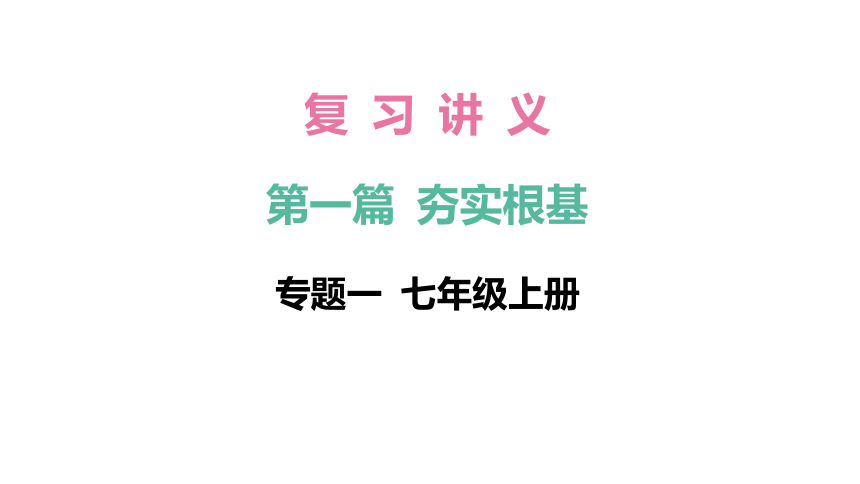
|
|
| 格式 | pptx | ||
| 文件大小 | 1.4MB | ||
| 资源类型 | 教案 | ||
| 版本资源 | 通用版 | ||
| 科目 | 英语 | ||
| 更新时间 | 2025-07-17 09:48:04 | ||
图片预览


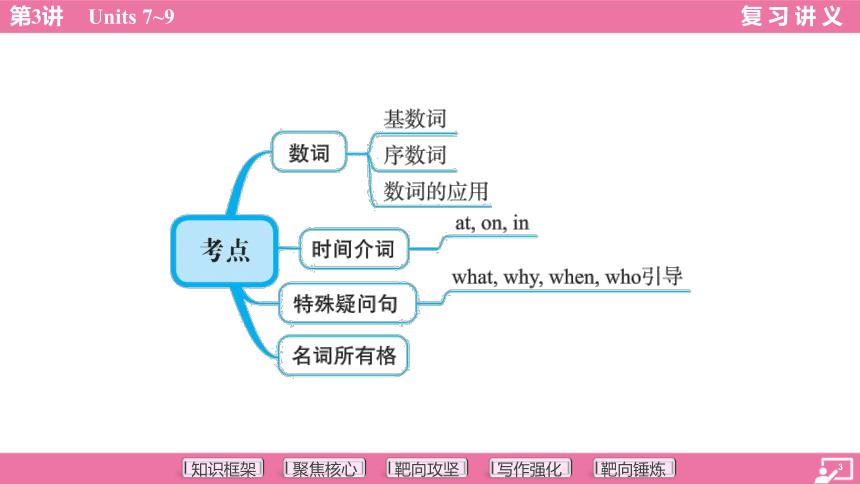
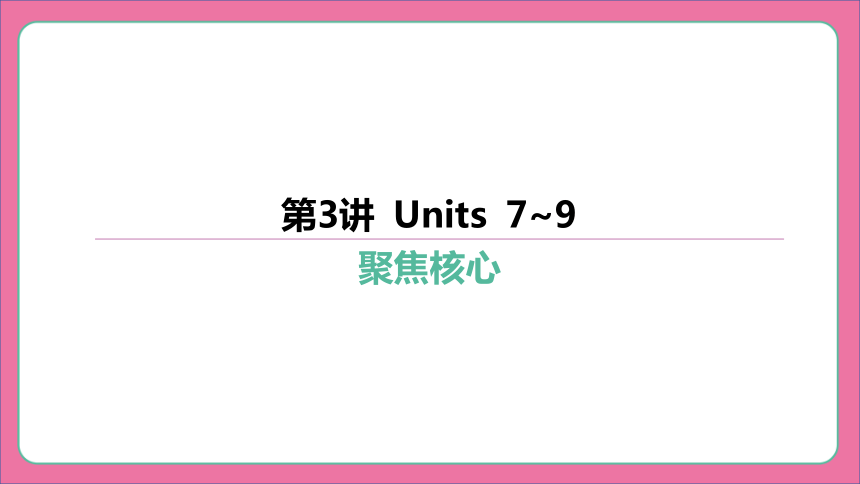
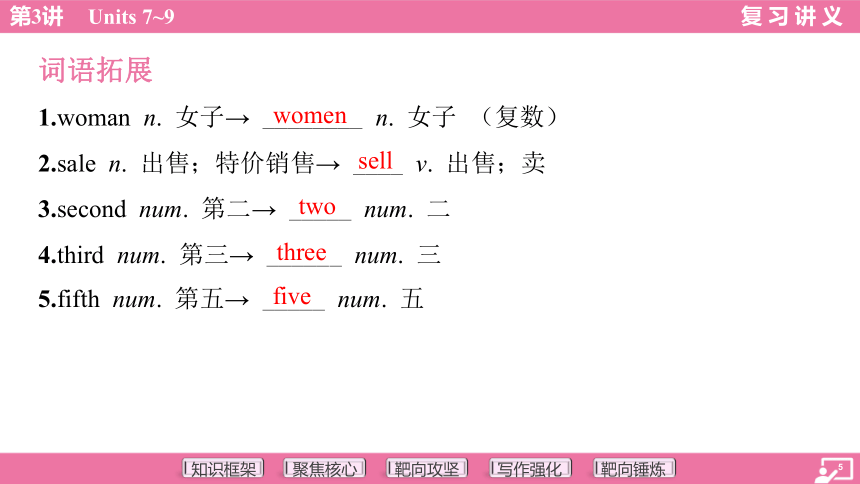
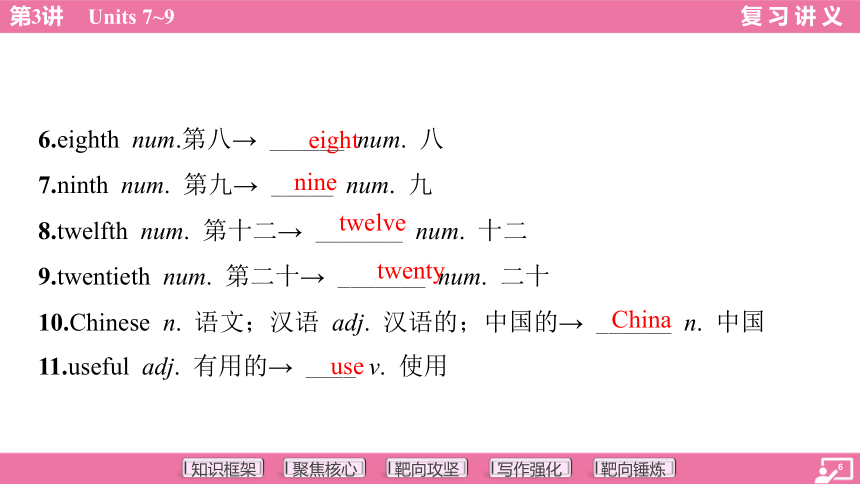
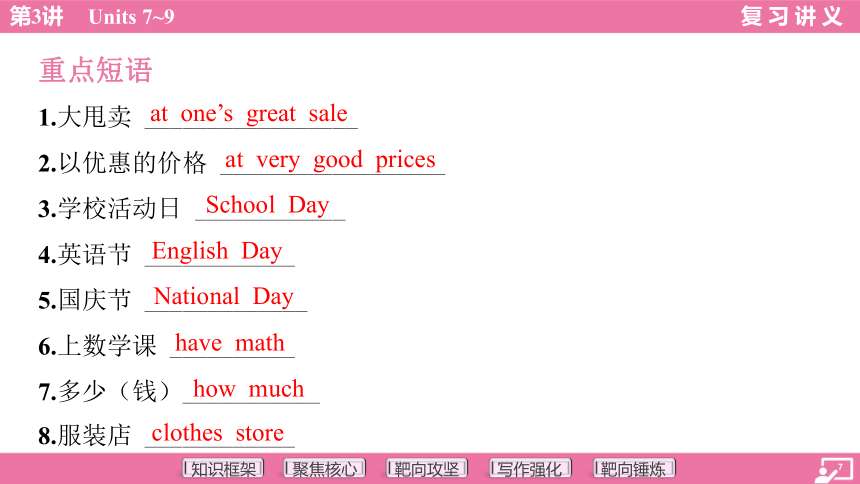
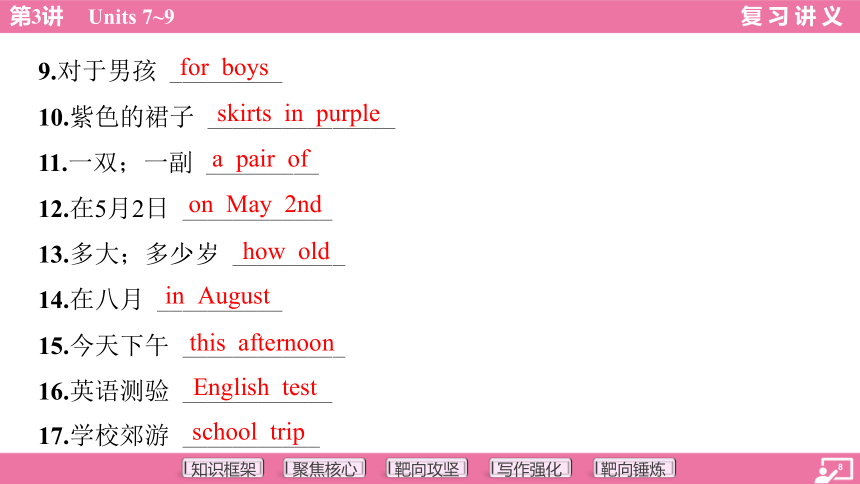
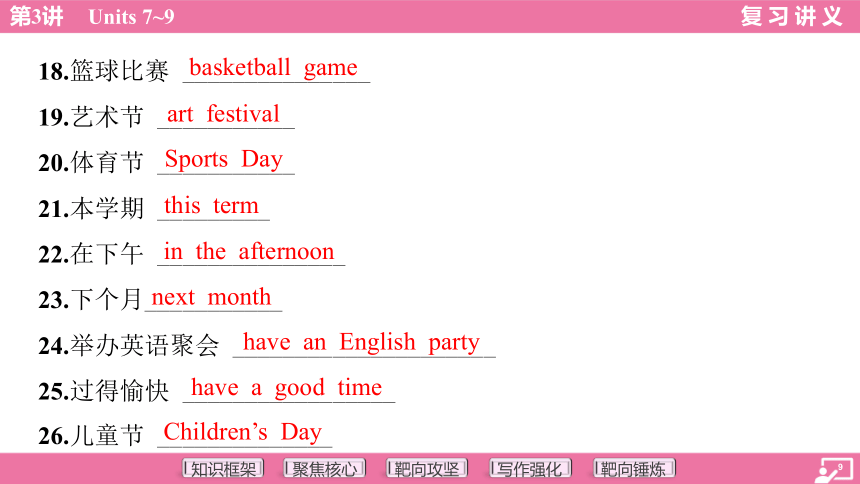
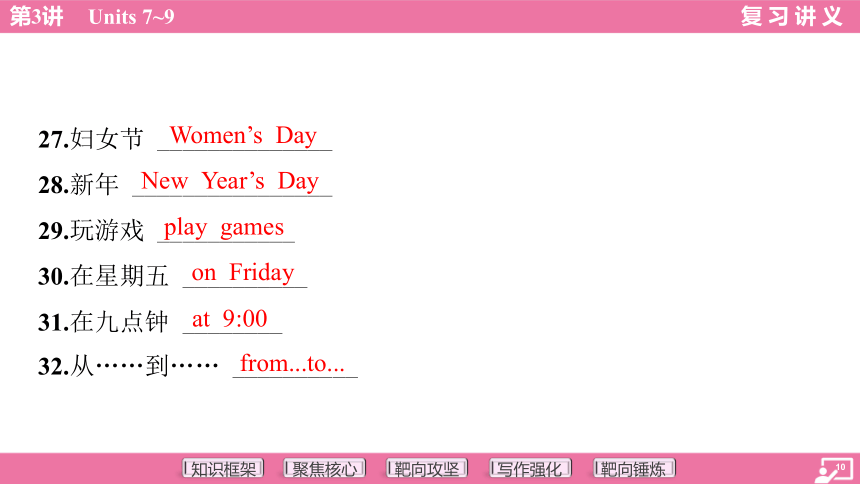
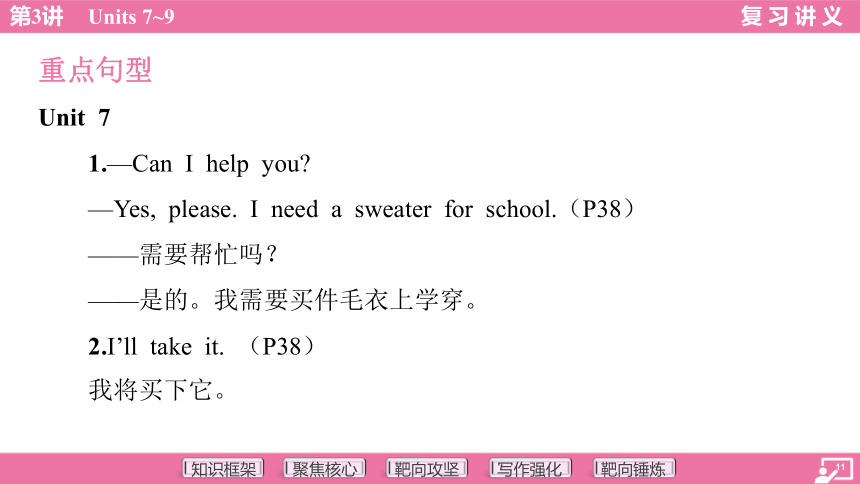
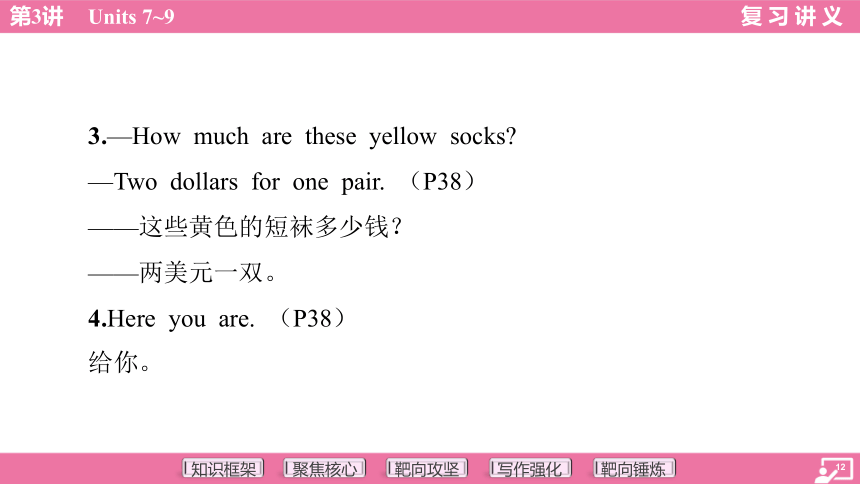
文档简介
(共60张PPT)
复 习 讲 义
第一篇 夯实根基
专题一 七年级上册
第3讲 Units 7~9
知识框架
第3讲 Units 7~9
聚焦核心
词语拓展
1.woman n. 女子→ ________ n. 女子 (复数)
2.sale n. 出售;特价销售→ ____ v. 出售;卖
3.second num. 第二→ _____ num. 二
4.third num. 第三→ ______ num. 三
5.fifth num. 第五→ _____ num. 五
women
sell
two
three
five
6.eighth num.第八→ ______ num. 八
7.ninth num. 第九→ _____ num. 九
8.twelfth num. 第十二→ _______ num. 十二
9.twentieth num. 第二十→ _______ num. 二十
10.Chinese n. 语文;汉语 adj. 汉语的;中国的→ ______ n. 中国
11.useful adj. 有用的→ ____ v. 使用
eight
nine
twelve
twenty
China
use
重点短语
1.大甩卖 _________________
2.以优惠的价格 __________________
3.学校活动日 ____________
4.英语节 ____________
5.国庆节 _____________
6.上数学课 __________
7.多少(钱)___________
8.服装店 ____________
at one’s great sale
at very good prices
School Day
English Day
National Day
have math
how much
clothes store
9.对于男孩 _________
10.紫色的裙子 _______________
11.一双;一副 _________
12.在5月2日 ____________
13.多大;多少岁 _________
14.在八月 __________
15.今天下午 _____________
16.英语测验 ____________
17.学校郊游 ___________
for boys
skirts in purple
a pair of
on May 2nd
how old
in August
this afternoon
English test
school trip
18.篮球比赛 _______________
19.艺术节 ___________
20.体育节 ___________
21.本学期 _________
22.在下午 _______________
23.下个月___________
24.举办英语聚会 _____________________
25.过得愉快 _________________
26.儿童节 ______________
basketball game
art festival
Sports Day
this term
in the afternoon
next month
have an English party
have a good time
Children’s Day
27.妇女节 ______________
28.新年 ________________
29.玩游戏 ___________
30.在星期五 __________
31.在九点钟 ________
32.从……到…… __________
Women’s Day
New Year’s Day
play games
on Friday
at 9:00
from...to...
重点句型
Unit 7
1.—Can I help you
—Yes, please. I need a sweater for school.(P38)
——需要帮忙吗?
——是的。我需要买件毛衣上学穿。
2.I’ll take it. (P38)
我将买下它。
3.—How much are these yellow socks
—Two dollars for one pair. (P38)
——这些黄色的短袜多少钱?
——两美元一双。
4.Here you are. (P38)
给你。
5.—How much is the hat
—It’s five dollars. (P39)
——这顶帽子多少钱?
——5美元。
Unit 8
6.Do you want to come to my birthday party (P44)
你愿意来参加我的生日聚会吗?
7.Happy birthday! (P44)
生日快乐!
8.—When is your birthday
—My birthday is on May 2nd. (P45)
——你的生日是什么时候?
——我的生日在5月2日。
9.—When is your father’s birthday
—His birthday is on April 21st. (P45)
——你爸爸的生日是什么时候?
——他的生日在4月21日。
Unit 9
10.My favourite subject is science. (P49)
我最喜欢的学科是科学。
11.—How’s your day
—It’s OK. (P50)
——你今天过得如何?
——还不错。
12.—Why does Bob like history
—Because it’s interesting. (P51)
——鲍勃为什么喜欢历史?
——因为它很有趣。
第3讲 Units 7~9
靶向攻坚
考点1 数词。
1.基数词。
基数词表示人或事物数目的多少,在句中起名词或形容词的作用,
在句中可以作主语、宾语、表语、定语和同位语等。
(1)1~12的基数词有各自对应的单词。
1 one 2 two 3 three 4 four
5 five 6 six 7 seven 8 eight
9 nine 10 ten 11 eleven 12 twelve
(2)13~19的基数词以-teen结尾。
13 thirteen 14 fourteen 15 fifteen 16 sixteen
17 seventeen 18 eighteen 19 nineteen
(3)20~90整十基数词以-ty结尾。
20 twenty 30 thirty 40 forty 50 fifty
60 sixty 70 seventy 80 eighty 90 ninety
(4)21~99之间非整十基数词是在十位数和个位数之间加连字符“-”
构成。例如:
21 twenty-one 35 thirty-five
47 forty-seven 99 ninety-nine
(5)101~999的基数词的表达方式为“基数词+hundred+and+整十位
数+‘-’+个位数”。例如:
101 one hundred and one
999 nine hundred and ninety-nine
(6)1,000以上的基数词。
从右向左数起,每隔三位数加一个逗号,依次为thousand(千),
million(百万), billion(十亿), 逗号中间有三位数。例如:
6,472,350,891读作:six billion, four hundred and seventy-two
million, three hundred and fifty thousand, eight hundred and ninety-one
注意:hundred, thousand, million, billion等词前面有基数词时, 这
些词要用单数形式; 若这些词与介词of搭配构成短语表示不确定的数目
时, 这些词要用复数形式。 例如:
two hundred students二百名学生
millions of workers数百万名工人
2.序数词。
序数词是用来表示人或事物顺序的先后的词。
序数词的构成。
基数词 变化规则 序数词
1,2, 3 不规则变化 first, second, third
4~19 基数词词尾加-th eleven—eleventh
以e结尾的基数词,去 掉e,加-th nine—ninth
以ve结尾的基数词, 把ve变成f,再加-th five—fifth
twelve—twelfth
基数词 变化规则 序数词
4~19 以t结尾的基数词,加 -h eight—eighth
20,30,……90 把y变为ie再加-th twenty—twentieth
sixty—sixtieth
两位数或多位 数(整十、百……除外) 只变个位数(hundred, thousand等只在词尾加-th) twenty-first第二十一; one
hundred and fifty-fourth第一百五十四; hundredth第一百
续表
3.数词的应用。
(1)年份、日期。
表达法 示 例
月、日、年(日用序数词,年 用基数词) *“某日”前要加the October the first, nineteen ninety-nine
(1999年10月1日)
日、月、年(the+序数词+of+月+年) the twenty-fifth of June, two thousand and twenty-three (2025年6月23日)
(2)年代。
in+the+基数词的复数形式。例如:
in the 1980’s/in the 1980s 在20世纪80年代
读作:in the nineteen eighties
(3)编号。
给事物编号时,序号在前用序数词,序号在后用基数词。例如:
the first unit=Unit One
(4)分数。
分子用基数词,分母用序数词。分子大于1时,分母要加-s。例如:
1/3 one third 4/5 four fifths
考点精练
1.The character of the novel is an artist in her ________.( )
C
A.thirtieth B.thirty C.thirties
2.—Where is your office
—My office is ________.( )
A
A.on the fifth floor B.on the five storeys C.at the fifth floor
考点2 时间介词at, on, in的用法。
介词 用法 示例
at 用在某个具体时刻之前或表示在 黎明、正午、黄昏、午夜 at 8:00在八点
at noon在中午
at night在夜晚
on 表示在具体的某一天或者某一天 的某一段时间 on Friday在星期五
on a cold day在寒冷的一天
on January 1st在一月一日
介词 用法 示例
in 表示在一段时间里(在将来时的 句子中则表示在一段时间之后) in winter在冬天
in 2025在2025年
in two days两天后
续表
考点精练
in on at
1.Classes begin ___ 8:00.
2.We have four lessons ___ the morning.
3.Flowers come out ___ spring.
4.She is afraid of going out ___ night.
5.I was born(出生) ____ July 1st, 2010.
at
in
in
at
on
考点3 what, why, when, who引导的特殊疑问句。
1.what是疑问代词,意为“什么”,常用于对事物、人名、电话号码
等进行询问。例如:
—What’s this 这是什么?
—It’s an eraser. 是一块橡皮。
what的常见用法。
询问职业:What+be+主语
What do/does +主语+do
询问天气:What+ be+the weather like
询问外貌:What do/does +主语+look like
询问性格、品质:What +be+主语+like
征求意见:What about... (=How about... )
2.why是疑问副词,意为“为什么”,用于询问原因,常用because引
导的句子回答。例如:
—Why do you like music 你为什么喜欢音乐?
—Because it’s relaxing. 因为它让人放松。
3.when意为“什么时候”,用于对时间进行提问。例如:
—When do you have PE 你们什么时候上体育课?
—On Wednesday morning. 星期三早上。
4.who是疑问代词,意为“谁”,用于对人进行提问,在句中可作主
语、宾语或表语。例如:
—Who is the girl in red 穿红衣服的那个女孩是谁?
—She’s my sister Gina. 她是我的妹妹吉娜。
考点精练
1.—________ do you plan to spend your summer holiday
—In my hometown.( )
A
A.Where B.When C.How
2.— ________ is in the office
—Mrs Read. She is preparing for tomorrow’s meeting.( )
C
A.What B.Which C.Who
考点4 名词所有格。
在英语中,表示名词所属关系的形式叫名词所有格。其构成方法有
以下几种:
1.有生命的事物的名词所有格,一般在词尾加“’s”。例如:
Mary’s book玛丽的书
my mother’s dress 我妈妈的连衣裙
2.以-s或-es结尾的名词,在词尾只加“’”; 不以-s或-es结尾的名词,
在词尾加“’s”。例如:
twenty minutes’ walk步行20分钟的路程
teachers’ office老师们的办公室
3.不以-s或-es结尾的复数名词,末尾仍要加“’s”。例如:
the policemen’s bedroom男警察的卧室
children’s presents孩子们的礼物
4.表示两个或多个人共同拥有的人或物时,只需在并列名词的后一
个名词词尾加“’s”。若表示两者或多人各自所拥有时,则每个名词后均
加“’s”。例如:
Lily and Lucy’s bedroom莉莉和露西的卧室
Susan’s and Sandy’s pens苏珊的钢笔和桑迪的钢笔
5.表示店铺、医院、诊所、住宅等名词时,常在名词后加 “’s”代表
全称。例如:
the doctor’s 诊所
Mr. Green’s 格林先生家
the bookseller’s书店
6.of所有格主要用于无生命的事物。例如:
a map of China一幅中国地图
the windows of the classroom教室的窗户
7.双重所有格。既表示所属关系又表示数量时,要用双重所有格。
例如:
an old friend of my father’s我爸爸的一位老朋友
a photo of Jim’s family’s吉姆的一张全家福
8.一些具有名词性质的复合不定代词(someone, everybody等)与
else连用时,“’”应加在else后。例如:
somebody else’s keys别人的钥匙
考点精练
1.Tomorrow is _________ (mother) Day. Let’s choose a gift for our
mum.
2.It is about 10 _________ (minute) walk from my home to school.
Mother’s
minutes’
第3讲 Units 7~9
写作强化
主题:自我介绍
写作强化
某地“美丽乡村(Beautiful Village)”项目吸引了不少外宾,暑假期间
需要数名擅长英语的小导游。假定你是李华,希望成为其中的一员。请
你结合以下内容提示,给该项目的外事负责人王先生写一封英文自荐信。
内容提示:
1.你的性格特点:友好、积极……
2.你擅长的方面:说英语,讲故事……
3.你可以做的事情:介绍当地文化,帮助外国人……
写作要求:
1.必须包含所有提示信息,可适当发挥;
2.80词左右。开头和结尾已给出,不计入总词数。
Dear Mr. Wang,
I am Li Hua. ______________________________________________
______________________________________________________________
______________________________________________________________
______________________________________________________________
______________________________________________________________
______________________________________________________________
______________________________________________________________
I am glad to know that you are in need of some
tour guides. I would like to be one of them. I think that I am suitable
for the job.
First of all, I am friendly and patient. I am active in many
activities. Besides, I not only speak English well but also have won
several prizes in English speaking competitions. I am also good at
telling stories. So I can introduce local culture to foreigners in English.
______________________________________________________________
______________________________________________________________
______________________________________________________________
Yours,
Li Hua
Most importantly, because I have visited the beautiful village many
times, I can help foreigners better understand the life of the village.
I would be thankful if I could be given the chance.
审题谋篇
审主题 自我推荐
审人称 第一人称
审时态 一般现在时为主
审要点 ①你的性格特点:友好、积极……
②你擅长的方面:说英语,讲故事……
③你可以做的事情:介绍当地文化,帮助外国人……
审结构 开篇:点明主题
中间:介绍你的性格特点、擅长的方面、可以做的事情
结尾:提出自己的希望,呼应主题
常用词句 [词语]
would like to be, be good at, be suitable for
[句型]
①I would like to be one of them.
②I can introduce local culture to foreigners in English.
续表
第3讲 Units 7~9
靶向锤炼
一、单项选择。
1.We have ________ Sports Day and ________ art festival in our
school.( )
B
A.\; a B.\; an C.an; an
2.Let’s go to the bookstore. We can get books ________ a very good
price.( )
A
A.at B.in C.of
3.Ms. Black has ________ sons, and the ________ son is a sports
star.( )
B
A.three; three B.three; third C.third; third
4.This is ________ room and it’s so big.( )
C
A.Jack’s and Nick’s B.Jack’s and Nick C.Jack and Nick’s
5.Linda has a trip this week and it’s ________ Saturday
morning.( )
C
A.at B.in C.on
6.I don’t like this CD ________ it’s boring.( )
A
A.because B.but C.so
7.What about this T-shirt It ________ nice on you.( )
B
A.sees B.looks C.sounds
8.The dictionary is ________, so you can buy it.( )
C
A.boring B.small C.useful
9.I like English ________ Chinese. I think they’re difficult ________
interesting.( )
B
A.and; and B.and; but C.but; and
10.—________
—Yes, I want some apples.( )
A
A.Can I help you?
B.Are those apples?
C.Where are apples?
二、用括号内所给单词的正确形式填空。
1.Bananas and strawberries are my _________(favorite).
2.September 10th is _________ (teacher) Day.
3.He must work forty ______(hour) a week.
4.The art _______(lesson) are interesting and I like them so much.
5.How many ________(subject) do you have at school
favorites
Teachers’
hours
lessons
subjects
6.That ______(look)like an interesting book.
7.He has a lot of _______ (thing) to do, so he can’t play soccer
with us.
8.Today I’m 12 and it’s my _______ (twelve) birthday.
9.We have a music ________ ( festival) in our school every year.
10.My shoes ____(be) brown. This new pair of blue shoes ___
(be) my sister’s.
looks
things
twelfth
festival
are
is
三、从方框中选择恰当的单词,并用其正确形式填空。每个单
词只能用一次。
lesson May use sweater friends
finish busy five good one
Dear Rose,
How’s it going I’m fine in school but I’m a little 1.______ on
Friday. Today is Friday. I have 2._____ classes, three in the morning
and two in the afternoon. Math is the 3._____ class. It is difficult but
I decide to study it 4._____. Why Because I think it is 5._______.
busy
five
first
well
useful
Science is at 9:30. It is interesting. My favorite 6._______ Chinese is
at 10:30. In the afternoon, I play soccer with my 7._______ in P. E.
class. The last class is music. In the evening, I need to 8.______ my
homework. Tomorrow is Saturday, so I don’t need to go to school.
Next month is 9._____. Mother’s Day is coming. I want to buy a
new 10.________ for my mother. What about you
My best wishes.
Jack
lesson
friends
finish
May
sweater
lesson May use sweater friends
finish busy five good one
四、阅读理解。
A poor man goes to a rich man’s house. On the way, he sees a
box under a tree. He opens it and sees some apples in it.
The man thinks, “I will have dinner in the rich man’s house. He
will give me nice food to eat. It will be very delicious.” So he
doesn’t eat the apples. He throws them away (扔掉).
The man walks on and comes to a river. He can’t go across it.
He waits for some time, but there is no boat coming. “What a bad
day! I can’t go to the rich man’s house today,” he thinks.
The man has to go back home. He doesn’t have any food at
home. He is very hungry. He thinks of the apples. He goes back to
the tree. He is very happy to see them near the tree, and he eats them
quickly.
The story tells us: Do not throw away good things; you may need
them some other time.
根据短文内容,判断下列句子的正(T)误(F)。
1.The poor man sees some apples on a tree.( )
F
2.The poor man goes across the river by a boat.( )
F
3.The poor man doesn’t have any food at home.( )
T
4.The poor man has dinner at the rich man’s house.( )
F
5.The poor man finally eats the apples.( )
T
复 习 讲 义
第一篇 夯实根基
专题一 七年级上册
第3讲 Units 7~9
知识框架
第3讲 Units 7~9
聚焦核心
词语拓展
1.woman n. 女子→ ________ n. 女子 (复数)
2.sale n. 出售;特价销售→ ____ v. 出售;卖
3.second num. 第二→ _____ num. 二
4.third num. 第三→ ______ num. 三
5.fifth num. 第五→ _____ num. 五
women
sell
two
three
five
6.eighth num.第八→ ______ num. 八
7.ninth num. 第九→ _____ num. 九
8.twelfth num. 第十二→ _______ num. 十二
9.twentieth num. 第二十→ _______ num. 二十
10.Chinese n. 语文;汉语 adj. 汉语的;中国的→ ______ n. 中国
11.useful adj. 有用的→ ____ v. 使用
eight
nine
twelve
twenty
China
use
重点短语
1.大甩卖 _________________
2.以优惠的价格 __________________
3.学校活动日 ____________
4.英语节 ____________
5.国庆节 _____________
6.上数学课 __________
7.多少(钱)___________
8.服装店 ____________
at one’s great sale
at very good prices
School Day
English Day
National Day
have math
how much
clothes store
9.对于男孩 _________
10.紫色的裙子 _______________
11.一双;一副 _________
12.在5月2日 ____________
13.多大;多少岁 _________
14.在八月 __________
15.今天下午 _____________
16.英语测验 ____________
17.学校郊游 ___________
for boys
skirts in purple
a pair of
on May 2nd
how old
in August
this afternoon
English test
school trip
18.篮球比赛 _______________
19.艺术节 ___________
20.体育节 ___________
21.本学期 _________
22.在下午 _______________
23.下个月___________
24.举办英语聚会 _____________________
25.过得愉快 _________________
26.儿童节 ______________
basketball game
art festival
Sports Day
this term
in the afternoon
next month
have an English party
have a good time
Children’s Day
27.妇女节 ______________
28.新年 ________________
29.玩游戏 ___________
30.在星期五 __________
31.在九点钟 ________
32.从……到…… __________
Women’s Day
New Year’s Day
play games
on Friday
at 9:00
from...to...
重点句型
Unit 7
1.—Can I help you
—Yes, please. I need a sweater for school.(P38)
——需要帮忙吗?
——是的。我需要买件毛衣上学穿。
2.I’ll take it. (P38)
我将买下它。
3.—How much are these yellow socks
—Two dollars for one pair. (P38)
——这些黄色的短袜多少钱?
——两美元一双。
4.Here you are. (P38)
给你。
5.—How much is the hat
—It’s five dollars. (P39)
——这顶帽子多少钱?
——5美元。
Unit 8
6.Do you want to come to my birthday party (P44)
你愿意来参加我的生日聚会吗?
7.Happy birthday! (P44)
生日快乐!
8.—When is your birthday
—My birthday is on May 2nd. (P45)
——你的生日是什么时候?
——我的生日在5月2日。
9.—When is your father’s birthday
—His birthday is on April 21st. (P45)
——你爸爸的生日是什么时候?
——他的生日在4月21日。
Unit 9
10.My favourite subject is science. (P49)
我最喜欢的学科是科学。
11.—How’s your day
—It’s OK. (P50)
——你今天过得如何?
——还不错。
12.—Why does Bob like history
—Because it’s interesting. (P51)
——鲍勃为什么喜欢历史?
——因为它很有趣。
第3讲 Units 7~9
靶向攻坚
考点1 数词。
1.基数词。
基数词表示人或事物数目的多少,在句中起名词或形容词的作用,
在句中可以作主语、宾语、表语、定语和同位语等。
(1)1~12的基数词有各自对应的单词。
1 one 2 two 3 three 4 four
5 five 6 six 7 seven 8 eight
9 nine 10 ten 11 eleven 12 twelve
(2)13~19的基数词以-teen结尾。
13 thirteen 14 fourteen 15 fifteen 16 sixteen
17 seventeen 18 eighteen 19 nineteen
(3)20~90整十基数词以-ty结尾。
20 twenty 30 thirty 40 forty 50 fifty
60 sixty 70 seventy 80 eighty 90 ninety
(4)21~99之间非整十基数词是在十位数和个位数之间加连字符“-”
构成。例如:
21 twenty-one 35 thirty-five
47 forty-seven 99 ninety-nine
(5)101~999的基数词的表达方式为“基数词+hundred+and+整十位
数+‘-’+个位数”。例如:
101 one hundred and one
999 nine hundred and ninety-nine
(6)1,000以上的基数词。
从右向左数起,每隔三位数加一个逗号,依次为thousand(千),
million(百万), billion(十亿), 逗号中间有三位数。例如:
6,472,350,891读作:six billion, four hundred and seventy-two
million, three hundred and fifty thousand, eight hundred and ninety-one
注意:hundred, thousand, million, billion等词前面有基数词时, 这
些词要用单数形式; 若这些词与介词of搭配构成短语表示不确定的数目
时, 这些词要用复数形式。 例如:
two hundred students二百名学生
millions of workers数百万名工人
2.序数词。
序数词是用来表示人或事物顺序的先后的词。
序数词的构成。
基数词 变化规则 序数词
1,2, 3 不规则变化 first, second, third
4~19 基数词词尾加-th eleven—eleventh
以e结尾的基数词,去 掉e,加-th nine—ninth
以ve结尾的基数词, 把ve变成f,再加-th five—fifth
twelve—twelfth
基数词 变化规则 序数词
4~19 以t结尾的基数词,加 -h eight—eighth
20,30,……90 把y变为ie再加-th twenty—twentieth
sixty—sixtieth
两位数或多位 数(整十、百……除外) 只变个位数(hundred, thousand等只在词尾加-th) twenty-first第二十一; one
hundred and fifty-fourth第一百五十四; hundredth第一百
续表
3.数词的应用。
(1)年份、日期。
表达法 示 例
月、日、年(日用序数词,年 用基数词) *“某日”前要加the October the first, nineteen ninety-nine
(1999年10月1日)
日、月、年(the+序数词+of+月+年) the twenty-fifth of June, two thousand and twenty-three (2025年6月23日)
(2)年代。
in+the+基数词的复数形式。例如:
in the 1980’s/in the 1980s 在20世纪80年代
读作:in the nineteen eighties
(3)编号。
给事物编号时,序号在前用序数词,序号在后用基数词。例如:
the first unit=Unit One
(4)分数。
分子用基数词,分母用序数词。分子大于1时,分母要加-s。例如:
1/3 one third 4/5 four fifths
考点精练
1.The character of the novel is an artist in her ________.( )
C
A.thirtieth B.thirty C.thirties
2.—Where is your office
—My office is ________.( )
A
A.on the fifth floor B.on the five storeys C.at the fifth floor
考点2 时间介词at, on, in的用法。
介词 用法 示例
at 用在某个具体时刻之前或表示在 黎明、正午、黄昏、午夜 at 8:00在八点
at noon在中午
at night在夜晚
on 表示在具体的某一天或者某一天 的某一段时间 on Friday在星期五
on a cold day在寒冷的一天
on January 1st在一月一日
介词 用法 示例
in 表示在一段时间里(在将来时的 句子中则表示在一段时间之后) in winter在冬天
in 2025在2025年
in two days两天后
续表
考点精练
in on at
1.Classes begin ___ 8:00.
2.We have four lessons ___ the morning.
3.Flowers come out ___ spring.
4.She is afraid of going out ___ night.
5.I was born(出生) ____ July 1st, 2010.
at
in
in
at
on
考点3 what, why, when, who引导的特殊疑问句。
1.what是疑问代词,意为“什么”,常用于对事物、人名、电话号码
等进行询问。例如:
—What’s this 这是什么?
—It’s an eraser. 是一块橡皮。
what的常见用法。
询问职业:What+be+主语
What do/does +主语+do
询问天气:What+ be+the weather like
询问外貌:What do/does +主语+look like
询问性格、品质:What +be+主语+like
征求意见:What about... (=How about... )
2.why是疑问副词,意为“为什么”,用于询问原因,常用because引
导的句子回答。例如:
—Why do you like music 你为什么喜欢音乐?
—Because it’s relaxing. 因为它让人放松。
3.when意为“什么时候”,用于对时间进行提问。例如:
—When do you have PE 你们什么时候上体育课?
—On Wednesday morning. 星期三早上。
4.who是疑问代词,意为“谁”,用于对人进行提问,在句中可作主
语、宾语或表语。例如:
—Who is the girl in red 穿红衣服的那个女孩是谁?
—She’s my sister Gina. 她是我的妹妹吉娜。
考点精练
1.—________ do you plan to spend your summer holiday
—In my hometown.( )
A
A.Where B.When C.How
2.— ________ is in the office
—Mrs Read. She is preparing for tomorrow’s meeting.( )
C
A.What B.Which C.Who
考点4 名词所有格。
在英语中,表示名词所属关系的形式叫名词所有格。其构成方法有
以下几种:
1.有生命的事物的名词所有格,一般在词尾加“’s”。例如:
Mary’s book玛丽的书
my mother’s dress 我妈妈的连衣裙
2.以-s或-es结尾的名词,在词尾只加“’”; 不以-s或-es结尾的名词,
在词尾加“’s”。例如:
twenty minutes’ walk步行20分钟的路程
teachers’ office老师们的办公室
3.不以-s或-es结尾的复数名词,末尾仍要加“’s”。例如:
the policemen’s bedroom男警察的卧室
children’s presents孩子们的礼物
4.表示两个或多个人共同拥有的人或物时,只需在并列名词的后一
个名词词尾加“’s”。若表示两者或多人各自所拥有时,则每个名词后均
加“’s”。例如:
Lily and Lucy’s bedroom莉莉和露西的卧室
Susan’s and Sandy’s pens苏珊的钢笔和桑迪的钢笔
5.表示店铺、医院、诊所、住宅等名词时,常在名词后加 “’s”代表
全称。例如:
the doctor’s 诊所
Mr. Green’s 格林先生家
the bookseller’s书店
6.of所有格主要用于无生命的事物。例如:
a map of China一幅中国地图
the windows of the classroom教室的窗户
7.双重所有格。既表示所属关系又表示数量时,要用双重所有格。
例如:
an old friend of my father’s我爸爸的一位老朋友
a photo of Jim’s family’s吉姆的一张全家福
8.一些具有名词性质的复合不定代词(someone, everybody等)与
else连用时,“’”应加在else后。例如:
somebody else’s keys别人的钥匙
考点精练
1.Tomorrow is _________ (mother) Day. Let’s choose a gift for our
mum.
2.It is about 10 _________ (minute) walk from my home to school.
Mother’s
minutes’
第3讲 Units 7~9
写作强化
主题:自我介绍
写作强化
某地“美丽乡村(Beautiful Village)”项目吸引了不少外宾,暑假期间
需要数名擅长英语的小导游。假定你是李华,希望成为其中的一员。请
你结合以下内容提示,给该项目的外事负责人王先生写一封英文自荐信。
内容提示:
1.你的性格特点:友好、积极……
2.你擅长的方面:说英语,讲故事……
3.你可以做的事情:介绍当地文化,帮助外国人……
写作要求:
1.必须包含所有提示信息,可适当发挥;
2.80词左右。开头和结尾已给出,不计入总词数。
Dear Mr. Wang,
I am Li Hua. ______________________________________________
______________________________________________________________
______________________________________________________________
______________________________________________________________
______________________________________________________________
______________________________________________________________
______________________________________________________________
I am glad to know that you are in need of some
tour guides. I would like to be one of them. I think that I am suitable
for the job.
First of all, I am friendly and patient. I am active in many
activities. Besides, I not only speak English well but also have won
several prizes in English speaking competitions. I am also good at
telling stories. So I can introduce local culture to foreigners in English.
______________________________________________________________
______________________________________________________________
______________________________________________________________
Yours,
Li Hua
Most importantly, because I have visited the beautiful village many
times, I can help foreigners better understand the life of the village.
I would be thankful if I could be given the chance.
审题谋篇
审主题 自我推荐
审人称 第一人称
审时态 一般现在时为主
审要点 ①你的性格特点:友好、积极……
②你擅长的方面:说英语,讲故事……
③你可以做的事情:介绍当地文化,帮助外国人……
审结构 开篇:点明主题
中间:介绍你的性格特点、擅长的方面、可以做的事情
结尾:提出自己的希望,呼应主题
常用词句 [词语]
would like to be, be good at, be suitable for
[句型]
①I would like to be one of them.
②I can introduce local culture to foreigners in English.
续表
第3讲 Units 7~9
靶向锤炼
一、单项选择。
1.We have ________ Sports Day and ________ art festival in our
school.( )
B
A.\; a B.\; an C.an; an
2.Let’s go to the bookstore. We can get books ________ a very good
price.( )
A
A.at B.in C.of
3.Ms. Black has ________ sons, and the ________ son is a sports
star.( )
B
A.three; three B.three; third C.third; third
4.This is ________ room and it’s so big.( )
C
A.Jack’s and Nick’s B.Jack’s and Nick C.Jack and Nick’s
5.Linda has a trip this week and it’s ________ Saturday
morning.( )
C
A.at B.in C.on
6.I don’t like this CD ________ it’s boring.( )
A
A.because B.but C.so
7.What about this T-shirt It ________ nice on you.( )
B
A.sees B.looks C.sounds
8.The dictionary is ________, so you can buy it.( )
C
A.boring B.small C.useful
9.I like English ________ Chinese. I think they’re difficult ________
interesting.( )
B
A.and; and B.and; but C.but; and
10.—________
—Yes, I want some apples.( )
A
A.Can I help you?
B.Are those apples?
C.Where are apples?
二、用括号内所给单词的正确形式填空。
1.Bananas and strawberries are my _________(favorite).
2.September 10th is _________ (teacher) Day.
3.He must work forty ______(hour) a week.
4.The art _______(lesson) are interesting and I like them so much.
5.How many ________(subject) do you have at school
favorites
Teachers’
hours
lessons
subjects
6.That ______(look)like an interesting book.
7.He has a lot of _______ (thing) to do, so he can’t play soccer
with us.
8.Today I’m 12 and it’s my _______ (twelve) birthday.
9.We have a music ________ ( festival) in our school every year.
10.My shoes ____(be) brown. This new pair of blue shoes ___
(be) my sister’s.
looks
things
twelfth
festival
are
is
三、从方框中选择恰当的单词,并用其正确形式填空。每个单
词只能用一次。
lesson May use sweater friends
finish busy five good one
Dear Rose,
How’s it going I’m fine in school but I’m a little 1.______ on
Friday. Today is Friday. I have 2._____ classes, three in the morning
and two in the afternoon. Math is the 3._____ class. It is difficult but
I decide to study it 4._____. Why Because I think it is 5._______.
busy
five
first
well
useful
Science is at 9:30. It is interesting. My favorite 6._______ Chinese is
at 10:30. In the afternoon, I play soccer with my 7._______ in P. E.
class. The last class is music. In the evening, I need to 8.______ my
homework. Tomorrow is Saturday, so I don’t need to go to school.
Next month is 9._____. Mother’s Day is coming. I want to buy a
new 10.________ for my mother. What about you
My best wishes.
Jack
lesson
friends
finish
May
sweater
lesson May use sweater friends
finish busy five good one
四、阅读理解。
A poor man goes to a rich man’s house. On the way, he sees a
box under a tree. He opens it and sees some apples in it.
The man thinks, “I will have dinner in the rich man’s house. He
will give me nice food to eat. It will be very delicious.” So he
doesn’t eat the apples. He throws them away (扔掉).
The man walks on and comes to a river. He can’t go across it.
He waits for some time, but there is no boat coming. “What a bad
day! I can’t go to the rich man’s house today,” he thinks.
The man has to go back home. He doesn’t have any food at
home. He is very hungry. He thinks of the apples. He goes back to
the tree. He is very happy to see them near the tree, and he eats them
quickly.
The story tells us: Do not throw away good things; you may need
them some other time.
根据短文内容,判断下列句子的正(T)误(F)。
1.The poor man sees some apples on a tree.( )
F
2.The poor man goes across the river by a boat.( )
F
3.The poor man doesn’t have any food at home.( )
T
4.The poor man has dinner at the rich man’s house.( )
F
5.The poor man finally eats the apples.( )
T
